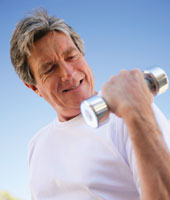Advertisement
Keeping an Older Metabolism Young
Let’s face it–most of us never worry about our metabolisms when we are young. In youth, metabolism is at its peak, and the body has a greater natural ability to burn fat and remain lean. Unfortunately, as we age, our metabolic rates naturally declines. We lose our lean metabolically active tissues, accumulate more body fat, … Continued

Let’s face it–most of us never worry about our metabolisms when we are young. In youth, metabolism is at its peak, and the body has a greater natural ability to burn fat and remain lean.
Unfortunately, as we age, our metabolic rates naturally declines. We lose our lean metabolically active tissues, accumulate more body fat, and lose muscle mass. This is why we may weigh the same in our later years as in our teenage ones, even though things certainly don’t look or feel the same. Much of the earlier us has been replaced with a softer mushier us.
But research indicates that we don’t have to experience a decline in metabolic activity with age–if we do the right things.
Don’t Lose It–Move It
We can’t blame our age-related metabolic decline solely on lost muscle. It turns out that younger people seem to have a higher metabolism than older people, even if they have the same amount of muscle. Studies indicate that age-related metabolic decline is intricately linked to how active we are and how much we eat throughout our lives.
Research published in the American Journal of Physiology in 2001 compared two groups of healthy, sedentary men (young and older) with two groups of physically active men (young and older). After factoring in the amount of lean body mass for each subject, the researchers discovered that metabolic decline is only related to reductions in exercise volume and energy intake. It does not occur in older men who are able to exercise and eat at a level similar to that of young, physically active men.
Men are not the only ones who can benefit from exercising at a higher intensity and eating more. Research from the University of Colorado showed that the age-related metabolic decline seen in sedentary women is not observed in women who exercise regularly.
Start Slowly–Choose Wisely
Before you decide to run a marathon or eat enough food to make you explode in an effort to enhance your aging metabolism, let’s get a few things straight. If you have never exercised or if you only exercise once in a while (a.k.a., Weekend Warrior Syndrome), start off slowly and work your way up to a higher intensity.
Secondly, in order to boost your aging metabolism, it is imperative to consume the right foods, including high-quality protein (grass-fed beef, game meat, free-run poultry, organic eggs, fish, and whey), essential fats (nuts, seeds, flaxseed oil, fish oils, and krill oil), and fibre-rich carbohydrates (vegetables, fruits, and whole organic grains).
The take-home message is simple: You can boost a slagging metabolism at any age with the right exercise and a proper diet. All you have to do is make it happen.




